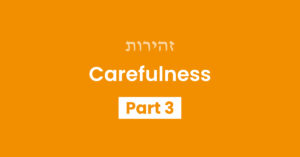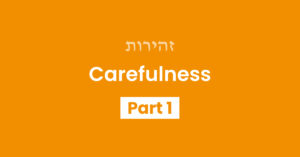We have been learning this month about the middah of Zehirus (being careful to perform mitzvos properly).As we quoted last week from Rav Yerucham Levovitz, Zehirus is the most fundamental middah, and is the key to our success in fulfilling all the mitzvos.
What gets in the way of Zehirus? We explained last week that in order to fulfill mitzvos properly, with Zehirus, we need to keep our eyes open and pay attention to what we’re doing. If we don’t pay attention to our actions, it’s as if we are living in darkness, like animals who act based on instinct alone.
Learning From Adam and Chava: The First Sin in World History
Aside from paying attention to what we’re doing, there is another key ingredient we need in order to help us perform mitzvos with Zehirus.
Let’s think back to the very first sin of mankind: What made Adam and Chava eat from the Tree of Knowledge? Why did they fail to keep this seemingly simple, easy mitzvah?
The Midrash1 explains: When Hashem forbade Adam and Chava from eating from the Eitz HaDaas, He warned: “On the day you eat from it, you will die.”2 But when Adam spoke to Chava, Adam didn’t convey Hashem’s message accurately. He added an extra warning, saying: “Don’t eat from the tree, and don’t even touch it.”
But when Adam spoke to Chava, Adam didn’t convey Hashem’s message accurately.
Soon after, the snake (who, according to Chazal, represents the yetzer hara) pushed Chava to touch the tree. Lo and behold… nothing happened! “See,” said the yetzer hara to Chava. “Just as you didn’t die from touching the tree, you wont die from eating from it either! Hashem lied when He said that eating or touching the tree would make you die!”
“Hmm,” thought Chava. “Adam told me that if I eat or even touch the tree, I will die. But I touched the tree, and nothing happened! So either Adam or Hashem were lying to me. Perhaps I can even eat from the tree too, and nothing bad will happen.” So Chava ate from the tree and gave Adam some fruit also. Immediately upon transgressing Hashem’s command, Adam and Chava were spiritually transformed. They were banished from Gan Eden, and their sin brought darkness, confusion, and curses upon all of humanity.
Understanding the Root of the Sin
So what made Chava sin? Chava sinned because she didn’t understand accurately what Hashem wanted from her. Hashem only forbade her from eating from the tree… But Chava thought Hashem had forbade her from touching it, too – since Adam had made up this additional command.3 Because Chava misunderstood what exactly was permitted and forbidden, the yetzer hara was able to confuse her into transgressing Hashem’s command.
Chava sinned because she didn’t understand accurately what Hashem wanted from her.
We see from here that in order to fulfill mitzvos properly, we must understand exactly what Hashem expects of us.
We see from here that in order to fulfill mitzvos properly, we must understand exactly what Hashem expects of us.
It’s not enough to just know general halachos, like “Don’t move muktzeh items on Shabbos” and “Don’t speak lashon hara.” We have to learn and be confident about the exact details of the halachos, too. Can I touch a muktzeh item, if it doesn’t move? Can I share negative information about someone if it will save someone else from harm?
Be Prepared
As much as we all try to brush up on halachos whenever we can, it’s particularly important to learn halachos in advance of tricky situations, so we wont get caught off guard by the yetzer hara. If we are unclear about whether something is permitted or forbidden, the yetzer hara will likely try to convince us that it’s permitted, and we might not have the clarity or conviction to fight back.
Learn halachos in advance of tricky situations
Imagine that it’s Friday night, and Moshe is about to climb into bed. Suddenly, Moshe realizes that he left his wallet on his bed before Shabbos! “Oh no,” he moans. “What should I do? I need to go to sleep, but I can’t move my wallet because it’s muktzeh!”
Moshe struggles within himself because he’s not sure what to do. “Well, Hashem certainly wants me to have a peaceful Shabbos,” he reasons. “We say ‘Shabbos Menucha’ – right? It must be that Hashem wants me to sleep. I’m sure Hashem would let me move my wallet off my bed.” So Moshe picks up his wallet and moves it onto his desk.
Was Moshe correct in his reasoning? Actually, he was not. Although Hashem does want us to have a peaceful Shabbos, we are still not allowed to pick up muktzeh items with our hands. Moshe transgressed the sin of Chillul Shabbos when he moved the wallet with his hands. However, there is a solution that Moshe didn’t know about! According to halacha, if a muktzeh item is resting on top of a non-muktzeh object that you need to use (i.e. the bed), you are allowed to move the muktzeh item by shaking it off.
If Moshe would have learned the halachos of muktzeh in advance, he would have known that he’s allowed to shake the wallet off the bed by shaking his blanket. But since Moshe had never learned the halachos of muktzeh, his yetzer hara was able to convince him to do the wrong thing.
But since Moshe had never learned the halachos of muktzeh, his yetzer hara was able to convince him to do the wrong thing.
When we are stuck in the middle of a situation and we’re not sure what to do, and there’s no one around to ask, it’s very easy to cave in and just do whatever feels right. In order to combat the yetzer hara who is trying to convince us to do the wrong thing, we need to learn the halachos in advance until we are confident about what we learned.
If you’re walking in the street on Shabbos and suddenly realize you have your credit card in your pocket, what should you do? Can you keep walking or do you need to drop it in the public domain where it’s likely to get stolen?
If you forget to say Yaaleh V’Yavo on Rosh Chodesh, do you need to repeat Shemoneh Esrei? What about on Chol Hamoed?
If you’re in a group of people who are speaking lashon hara, do you need to sstop them? What if they will get offended?
If you wash Netilas Yadayim for bread, and then accidentally talk before you take a bite, do you need to wash again? With a new bracha?
Just as Chava’s confusion about what exactly was forbidden and what was permissible left room for the yetzer hara to confuse her, we, too are likely to make the wrong decision if we are not prepared in advance about what the halachah requires.
For this reason, Chazal teach us that learning Torah is a prerequisite for Zehirus.4 The more we understand exactly what Hashem expects of us, the more we will be able to perform mitzvos with Zehirus.
Learning Torah is a prerequisite for Zehirus.
Perhaps this can also explain why the Torah is compared to light, as it says, “Ki Ner Mitzvah V’Torah Ohr – Mitzvos are candles and the Torah is light“5 Just as we need to turn on the lights in order to see what we’re doing, we need to flood ourselves in the light of Torah in order to know with clarity how to perform mitzvos properly. Without the light of Torah, we are essentially living in darkness, left as easy prey for the yetzer hara to come and confuse us.6
This week, let’s make an extra effort to learn halachos that we didn’t know before. This is especially important today, on Asarah b’Teves, because today we are mourning the destruction of the Beis HaMikdash, which, according to the Navi7, was destroyed “Al Azvam Es Torasi – Because they left My Torah.”
Hopefully, if we increase our efforts this week in learning more Torah and halachah, we will show Hashem that we have not left His Torah and we want to live “in the light.” In this merit, may Hashem bring Mashiach very soon and bring us “Mei’Afeilah L’Orah, U’Misheebud L’Geulah – from darkness to light, and from subjugation to redemption.“
Sources: [1] Bereishis Rabbah 19:3; also Rashi Bereishis 3:3; [2] Bereishis 2:17; [3] See Avos D’Rabbi Nassan Chapter 1; [4] See Mesilas Yesharim Chapter 4 and Avodah Zarah 20b; [5] Mishlei 6:23; [6] See Pri Tzaddik: Rosh Chodesh Shevat 5; [7] Yirmiyahu 9:12
Your Challenge
Once a day, learn a NEW halachah that you didn’t know before – or review halachos that you don’t remember so well.
You can learn the halachos from a sefer, or you can think of a question and ask a Rav.
FOR EXAMPLE:
Learn/review the halachos of Tefillah, Muktzeh, Brachos, Shmiras HaLashon, Bishul, Borer, other Shabbos halachos, Hilchos Bein Adam L’Chaveiro, Hilchos Netilas Yadayim, the halachos of saying Amen correctly, etc.
Torah Questions
- Which mitzvah did Hashem give us to remind us to fulfill all of the rest of the mitzvos? (See Bamidbar 15:39)
- According to Tehillim 19:9, what effect do mitzvos have on your eyes?
- According to Mishlei 19:16, if a person “guards” the mitzvos (i.e. he is careful to fulfill mitzvos), then his ___?___ will also be protected.
- According to Ben Azai in Pirkei Avos 4:2, why should a person chase after a “minor” mitzvah just as enthusiastically as he chases after a more serious mitzvah?
- The Gemara (Shabbos 130a) says that just as a dove’s ____ offer protection for itself, so too, mitzvos offer protection for the Jewish people.
- The Gemara (Bava Metzia 59a) writes that a man should always be careful to honor his wife, because _____?
- In Kiddushin 40b, Rabbi Tarfon and Rabbi Akiva argue: Which is greater: learning Torah, or doing acts of mitzvos? They concluded that learning Torah is better. Why?
Questions to Ponder
- The Yalkut Shimoni says that mitzvos are compared to candles, and the Torah is compared to light. Just as candles only provide light temporarily (until they are extinguished), mitzvos only provide protection temporarily – whereas Torah provides protection for eternity. What do you think it means that mitzvos only provide temporary protection, whereas Torah provides protection forever?
- The Mesilas Yesharim says that a person should try to develop the middah of Zehirus (being careful with performing mitzvos) BEFORE working on the middah of Zrizus (doing mitzvos quickly, with alacrity). Why do you think Zehirus should come before Zrizus?
- Rabbeinu Bachye says that some mitzvos benefit the body, and some benefit the soul. Can you think of examples of mitzvos that benefit the body?





